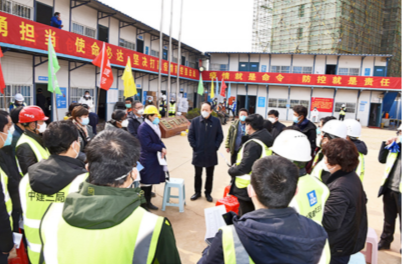Serving the people
When the medical team from Zhejiang Province left Wuhan in central China's Hubei Province in March 2020, after nearly a month of a high-intensity battle against COVID-19, Ge Minghua decided to stay on at the Wuhan Jinyintan Hospital intensive care unit. Ge is president of Zhejiang Provincial People's Hospital and deputy to the National People's Congress (NPC) from Zhejiang in east China. At the time, the hospital was still treating patients in critical conditions even though the epidemic situation in the city was subdued.
"Wherever we went, we would never flinch," he said.
Ge and his team were in charge of two inpatient areas at Jinyintan, and of the 73 patients they treated, none died or underwent a more critical turn. "What impressed me most were the Wuhan people's strong hearts and the medical teams' dedication," he said.
Ge was among the over 2.6 million deputies to people's congress at various levels who rose to the challenge and devoted themselves to fighting the pandemic, which gripped the entire world and caused devastation not seen in a century.
Virus fighters
Nearly 3,000 NPC members in total devoted themselves to fighting the virus.
In January 2020, Zhang Boli, deputy to the NPC and president of Tianjin University of Traditional Chinese Medicine (TCM), flew to Wuhan, where the disease was first detected in the country. During his 82-day battle on the frontline, Zhang and his team treated over 500 patients.
As a TCM expert, Zhang presided over COVID-19 treatment research, combining TCM and Western medicine. He noted that the two complement each other as Western medicine offers important life-supporting measures such as respiratory and circulatory assistance, while TCM focuses on improving patients' physical condition and immunity.
Large-scale use of TCM markedly reduced the rate of illness among four vulnerable categories of people. Over 90 percent of COVID-19 patients received TCM, while its clinical efficacy was above 90 percent.
He was awarded the national honorary title of People's Hero along with military medical scientist Chen Wei and Zhang Dingyu, head of Jinyintan Hospital. They were recognized for their tremendous work against the novel coronavirus disease at the Great Hall of the People in Beijing on September 8, 2020.
Cheng Jing, an NPC deputy and a scientist whose team developed China's first DNA "chip" to detect Severe Acute Respiratory Syndrome 17 years ago, also contributed significantly to the battle against COVID-19. As an academician of the Chinese Academy of Engineering, Cheng and his research team developed in a week a respiratory virus nucleic acid detection kit, the first in the world to detect the virus within an hour and a half.
"Without the wealth of experience that we accumulated in past years and the continuous support from the country for this sector, we could not have completed the mission so fast," Cheng said. In the thick of the crisis, Cheng's team donated the chips and detection reagents to Wuhan worth 5 million yuan.

Chen Huayuan (center), deputy to the National People's Congress and former president of the China Construction Third Engineering Bureau, visits construction workers who built Huoshenshan Hospital to fight the COVID-19 epidemic in 2020 in Wuhan of Hubei Province on February 4.
Back on track
As China began to rebound from the epidemic, the country has aimed to resume work and production in an orderly and effective manner. NPC members have been leading the way in China's economic and social recovery, while at the same time fending off a resurgence of infections.
In March 2020, NPC deputy Cheng Ju, also secretary of the Communist Party of China Xiazhuang Village branch in Hubei, got busy with helping farmers with their spring planting. She went door-to-door recording details of their seed and fertilizer needs in advance to get personnel to place orders to facilitate timely planting. With the gradual recovery of production, workshops that made the sanitary cotton gauze needed for masks resumed production in the village.
"My job is to serve the people and help them solve their problems," Cheng said. In her opinion, the most important duty for NPC deputies is to make the voices of the people from the grassroots heard and their needs met.
"The epidemic was a huge test for us, and it also gave me a deeper understanding of rural work," Cheng said. She kept a journal to record her experiences and thoughts on work during the epidemic control and prevention period. During the annual NPC session in 2020, she shared her story with other legislators and the entire country, allowing more people to pay attention to and understand the countryside.
During this year's NPC session, she proposed ideas on consolidating the results of poverty alleviation in the rural area while promoting rural revitalization.
NPC deputies from the business field contributed their share in the resumption of work and production as epidemic prevention and control is conducted on a regular basis. The operator of one of the largest online marketplaces in China, 58.com, offered fee waivers for small and medium enterprises (SMEs), such as posting recruitment information on its website. Online training courses were open to all, helping over 100,000 employees to improve their vocational skills. Yao Jingbo, founder, chairman and CEO of 58.com, said that as an NPC deputy, he felt a special responsibility to serve the people at this particular trying time. "Relying on our brand reputation and our technology and big data strengths, we could help more SMEs to quickly overcome barriers and get back on their feet, which could further boost employment, resume production and improve people's lives," Yao said.
(The National People's Congress 2021 ISSUE 3)
- Top legislature schedules standing committee session for late February
- China's top legislator meets with Uruguayan president
- Senior legislator surveys Anhui on formulating outline of provincial 15th Five-Year Plan
- China's top legislator meets with British PM
- NPC deputies see more engagement with top court



